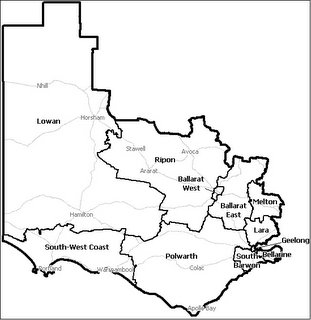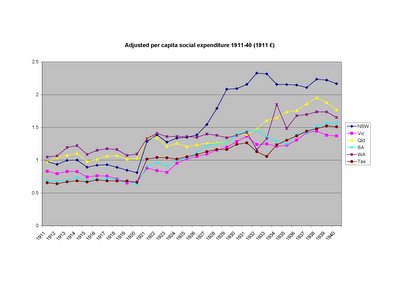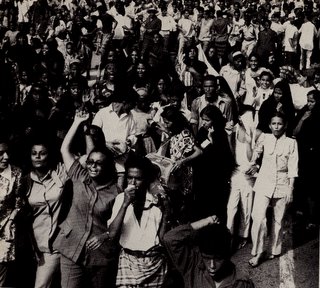Recently in Australia we have seen an upsurge of conservative complaints about the political views of University staff. These have principally been the work of Wollongong academic Gregory Melleuish:
This stranglehold of the disaffected and dyspeptic in many key areas of the humanities and social sciences has had quite dire consequences. The first is that in these areas Australian universities have ceased to be national institutions and have become instead strongholds of minority sectarian views. To be a national institution, a university has to be as comprehensive as possible. It has to include within itself as broad a range of intellectual positions as is feasible. Unfortunately in the recent past this often meant a full range of Marxist ideologies from Stalinism to Trotskyism to Maoism. More recently feminism and postmodernism have been added to this list.
Melleuish's own academic career is a curious one. He has only two commercially books to his name, the last published in 1998. The first Cultural Liberalism in Australia is interesting, although marred as I argue here by a strange attempt to interpret V. G. Childe, a fairly orthodox Marxist as a 'cultural liberal'. Childe thought Stalin was a great statesman and Marxist theorist but this makes no appearance in the book. The Packaging of Australia was an interesting discussion of Australian national identity which I have recommended to my students. Melleuish's politics were those of a free-market liberal, and one might have thought he would continue is this direction welcoming the Howard's government's economic reforms but being critical of high levels of public spending and its often illiberal social agenda. His own work on the history of the Liberal party has presented an economic liberal 'black armband view' with Australia seen as having taken a wrong turn before 1914 towards protectionism and illiberalism. Curiously however he has become shrill and hysterical defender of the Howard government and recently praised a fairly banal speech by Howard as a path breaking work (The obverse of this conservative cult of Howard is the left preoccupation with microanalysis of the PM's most routine utterances). On one level Melleuish's trajectory may be due to his own low level of academic productivity, it is easier to play the provocateur than to complete serious research. His argument has been presented in cruder form by Jason Briant:
Since their takeover by the Left, many universities have used their position to try to indoctrinate future generations of societal elites against the very values upon which our civilisation is built, which constitutes a total reversal of their original mission. There is an urgent need to think of means that would restore balance to the universities and return them to their original role as the guardians of our civilisation and culture. This is something with which conservative thinkers and policy-makers have not as yet come to grips.
What do these utterances suggest for the future of universities? Briant notes:
The final challenge facing Australian conservatism is to become better organised. There remains a great gulf between the intellectual forces of conservatism operating in think-tanks, business groups and isolated pockets of academe on the one hand, and the political forces of conservatism sitting in the various Australian parliaments on the other. There is a need for better communication and co-ordination between the intellectual wings and the political wings of conservatism.
Melleuish is an academic-political entrepreneur seeking to drum up interest among Liberals for a crusade with him as leader. In the US campaigns for 'balance' in academia have been a major theme of the right, with a recent controversy about a conservative student activist paying students to tape academics to provide evidence of bias at UCLA, and legislation 'the academic bill of rights' has been proposed to enforce political 'balance'. As with Melleuish and Briant support for Democrats or ALP has been defined as a manifestation of disloyalty. As Russell Jacoby notes:
In a sign of the times, the test for disloyalty has shifted far toward the center. Once an unreliable professor meant an anarchist or communist; now it includes Democrats. Soon it will be anyone to the left of Attila the Hun. Second, the charges do not (so far) come from government committees investigating un-American activities but from conservative commentators and their student minions. A series of groups such as Campus Watch, Academic Bias and Students for Academic Freedom enlist students to monitor and publicize professorial conduct. Third, the new charges are advanced not against but in the name of academic freedom or a variant of it; and, in the final twist, the new conservative critics seem driven by an ethos that they have adopted from liberalism: affirmative action and a sense of victimhood, which they officially detest.
This definition of dissent as treason has been taken up the American equivalent of Keith Windshuttle David Horowitz in his 'six degrees of separation' Discover the Network
according to Horowitz:
In his State of the Union address last night the President drew attention to the difference between critics of the war in Iraq who want us to win the war on terror, and critics who are "defeatists" -- who want us to lose. Cindy Sheehan who was arrested attempting to disrupt the President's speech and her patron Michael Moore want us to lose. They are not defeatists (the President is as always polite) but traitors. Not in the Constitutional sense (which is very strict) but in the sense that really matters -- morally. They are willfully betraying us to our terrorist enemies.
if Tony Abbott had become federal education minister I thought this theme may have been taken up at the level of government, but for the foreseeable future I suspect Melleuish and Briant will remain on the fringe..hopefully.






